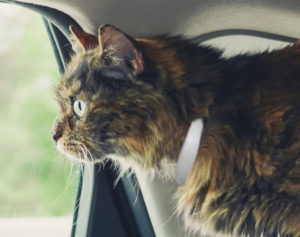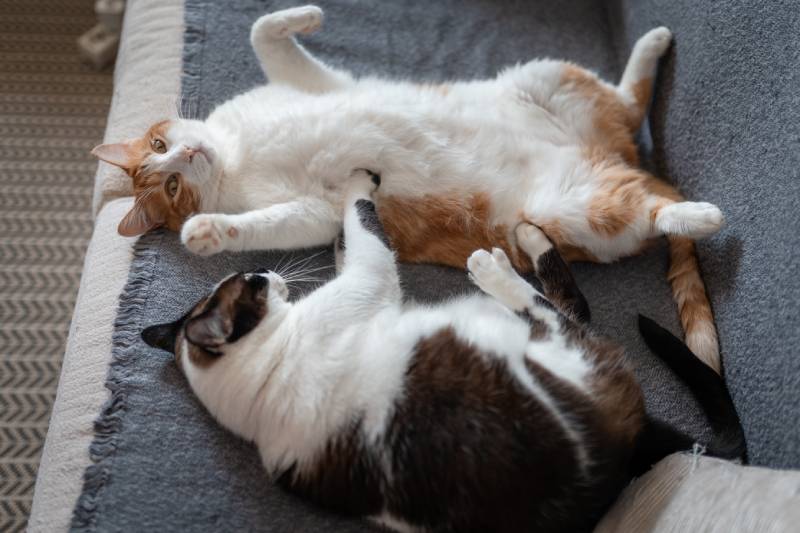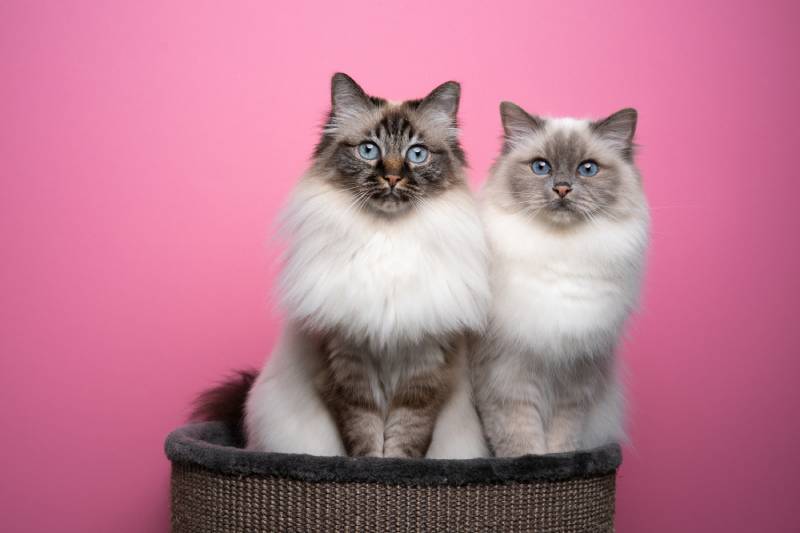7 Best Calming Aids for Cats – 2024 Reviews and Top Picks
Updated on

Having a cat that suffers from anxiety is heartbreaking. However, the good news is that you don’t have to feel helpless, as there are several options available to you to help relieve your kitty’s stress. However, finding the right one for your cat can take some trial and error, as each animal is unique.
That’s why we combed through dozens of calming products for cats to find the most beneficial and effective options. After our reviews, we have selected seven products, which we believe are the best calming aid for cats.
We hope this list will help you find the right product for your beloved feline.
 A Quick Comparison of Our Winners (2024)
A Quick Comparison of Our Winners (2024)
| Rating | Image | Product | Details | |
|---|---|---|---|---|
| Best Overall |
 |
Feliway Classic Calming Diffuser |
|
Check Price |
| Best Value |

|
Pet Naturals Calming Cat Chews |
|
Check Price |
| Premium Choice |

|
Pet Acoustics Pet Tunes Calming Music |
|
Check Price |

|
Feliway MultiCat 30 Day Starter Kit Calming Diffuser |
|
Check Price | |

|
ThunderShirt Anxiety Vest |
|
Check Price |
The 7 Best Calming Aids for Cats
1. Feliway Classic Calming Diffuser – Best Overall

| Type of product: | Pheromone diffuser |
| Lifestage: | Adult |
The Feliway Classic Calming Diffuser mimics the pheromones emitted by the female cat when nursing her kittens. What could be more comforting than the smell of a mother? So, thanks to a synthetic version of this pheromone, the Feliway Diffuser helps soothe anxious cats in a gentle and subtle way. This diffuser is also recommended by veterinarians and is clinically proven to be effective on 90% of cats. However, although this option is our best overall, there is no such thing as perfection.
Thus, it is possible that the pheromone has no effect on your cat since some felines are insensitive to it. Also, if you have a very large living space, the diffuser will not work, since there is a certain limit to its coverage.
- Clinically proven to be effective
- Most cats will show improvement within 7 days
- Easy to use
- Works wonders for most cats
- Not effective on all cats
- Will not work in spaces larger than 700 square feet
2. Pet Naturals Calming Cat Chews – Best Value
| Type of product: | Soft chew supplement |
| Lifestage: | All stages |
Pet Naturals Calming Cat Chews are an economical option for owners of stressed cats. These treats can calm your cat with ingredients specially formulated by veterinarians. Plus, these soft little bites contain natural ingredients that can be incorporated into your pet’s specific diet. They also help reduce the kitty’s destructive or aggressive behavior, without making it drowsy.
The suggested serving is one treat per day, but you can up to triple the dosage for very stressed cats. However, if you go at this rate, the low-cost aspect of this option will be a thing of the past!
- Veterinarian formulated
- Helps manage behavioral issues
- Meets the standards of the National Animal Supplement Council (NASC)
- Budget-friendly
- Some cats don’t like it
- Not as economical if used daily
3. Pet Acoustics Pet Tunes Calming Music – Premium Choice
| Type of product: | Cat speaker |
| Lifestage: | Adult |
You probably know the benefits of music to calm tired and stressed minds. But did you know that there is music specially designed to calm nervous and restless cats? Introducing the Pet Acoustics Pet Tunes Calming Music, a Bluetooth speaker that plays soothing, frequency-modified music that is clinically proven and vet-approved to reduce stress and calm nervous feline behaviors. Plus, this tiny device plays music 24/7 if plugged into a USB wall adapter—enough to make sure you maintain your cat’s calm day and night!
Its only downside to us is its fairly steep price, but our calm cats think that it’s well worth the cost.
- Clinically proven to be effective
- Calm music that is also audible to humans
- Award-winning product
- Plays continuously for up to 8 hours
- Recommended by vets
- Expensive
4. Feliway MultiCat 30 Day Starter Kit Calming Diffuser – Best for Multi-Cat Households
| Type of product: | Pheromone diffuser |
| Lifestage: | All stages |
Feliway MultiCat Calming Diffuser is a 30-day starter kit, made especially for homes with multiple cats. It works in the same way as the original diffuser: it imitates the natural pheromones of the cat, in order to reduce tensions and conflicts between several cats. Be careful, however, if you have parakeets or parrots in your home; these birds are known for their sensitive respiratory systems and pheromones could be dangerous for them.
Furthermore, you must adhere to the space requirements for use, otherwise, the product will be ineffective.
- Clinically proven to help reduce conflict between cats
- Recommended by vets
- Good alternative to the collar
- Not effective on all cats
- May be dangerous for some pet birds
Related: 10 Best Cat Calming Sprays
5. ThunderShirt Anxiety Vest
| Type of product: | Compression vest |
| Lifestage: | Adult |
The ThunderShirt for cats is a compression vest that is used to soothe the cat, much like swaddling a baby. Apparently, this pressure is helpful in relieving anxious and stressed kitties. However, there has not been much official research on the effect of compression vests on anxious cats; nonetheless, they have been shown to have a calming effect on dogs. The major downside to this vest is that it can be very difficult to put it on your cat, especially if your animal is already in a state of extreme anxiety. They could hurt you and themselves, which would be completely counterproductive.
But there are cats who will not be reluctant to have this vest put on and who will really benefit from its soothing effects. It’s up to you to see if your pet is one of these more docile cats.
- Recommended by veterinarians
- Proven effective in over 80% of cats
- Work well for nail trimming
- Can be difficult to get it on the cat
- May cause irritation in some cats
6. Sentry Good Behavior Calming Collar
| Type of product: | Collar |
| Lifestage: | All stages |
Some of the most popular products for anxiety in cats are calming pheromone-infused cat collars, such as the Sentry Good Behavior Calming Cat Collar. The pheromones in this collar work the same way as those in diffusers, that is, they mimic the pheromones that moms produce to calm their kittens. But, as in the case of the diffuser or other types of spray, this collar has no effect on some cats.
In addition, it can be difficult to put on your cat, especially if your cat is not used to wearing collars. Still, the affordable cost of this product allows you to give it a try without breaking the bank.
- Scientifically proven to reduce stress-related behaviors in cats
- Works relatively fast for most cats
- Easy to use
- Needs to be replaced every month
- Not all cats tolerate wearing a collar
7. Royal Canin Veterinary Diet Calm Formula
| Type of product: | Dry food |
| Lifestage: | Adult |
Anti-anxiety cat foods contain nutrients such as L-tryptophan, a compound found in turkey and associated with drowsiness. These diets are also intended to soothe stomach aches, which could be a source of anxiety in cats.
Royal Canin Feline Calm is a veterinary-only dry cat food specially formulated to help provide soothing nutrients to cats facing stressful environments or situations. This formula does include L-Tryptophan, which should help calm your cat in stressful environments or situations. Be aware, however, that you need the authorization of your veterinarian before buying this quite expensive food.
- Helps soothe stomach aches
- Prevents skin irritation
- Works great for most cats
- Expensive
- Requires authorization from vet prior to purchase
 Buyer’s Guide: Selecting the Best Calming Aid for Cats
Buyer’s Guide: Selecting the Best Calming Aid for Cats
What Are the Causes of Stress in Cats?
Identifying the cause(s) of stress in cats can take time. However, it is important to look for them, because only resolving them will help your pet feel better.
- Cohabitation between several cats. Cats are territorial and creatures of habit. The arrival of a new kitten at home can disturb your feline, which used to reign supreme in his environment. And even if you have several cats who have been living together for a long time, they can still find cohabitation difficult.
- The arrival of a new animal or baby in the household. Same story here: your cat may feel disturbed if a new “intruder” enters his territory and settles there.
- Having guests. Receiving visitors in your home disrupts your cat’s natural territory. Some may experience it badly and get anxious, isolate themselves, or even be aggressive.
- Change of territory. A change of territory, such as moving, can cause a lot of stress for your feline. The same goes for any disturbance in its territory, such as renovating your basement or your kitchen!
- A dietary change. Cats enjoy regularity in their diet. Thinking of making him happy by varying his menus is a mistake; on the contrary, it reinforces his anxiety. Give him quality food, mainly kibble, and don’t change if it suits him.
- Poor food distribution. Cats appreciate several small rations per day. If you only feed him once or twice a day, he may get stressed out for fear of missing out.
- Car transport. Your cat may have difficulty supporting car transport. This issue can be explained by motion sickness or by the association of these trips with an unpleasant event, such as a visit to the vet.
- Illness. Stress can also be the result of illness or suffering.
How Does Stress Manifest in Cats?
- Growing aggression: If your cat is used to being calm and docile, stress may be causing him to become aggressive. In this case, he may start spitting or hissing, biting, scratching, refusing contact, or even bristling his hair for no apparent reason. His pupils will often be dilated and fixed.
- Increased anxiety: The stressed cat is generally anxious. He is afraid of the slightest noise, he develops phobias and he can react by changing his behavior suddenly. This anxiety can cause him to self-injure by biting or pulling tufts of hair, but he can also ingest any type of object, which is very dangerous.
- Frequent meowing: A cat communicates a lot to his human parent by meowing. Long, loud, rather severe meows are often a sign of stress.
- Compulsive licking: When feeling stressed or depressed out of boredom, cats tend to compulsively lick themselves, mainly their paws. If he also licks his stomach or tail when you touch him, stress could be the cause. This behavior can lead to hair loss in the licked areas and irritation resulting in scab formation.
- Incontinence and messiness: Stressed cats will usually defecate outside of the litter box. To show their discomfort, they also tend to urinate where you can see them.
- Clawing: A stressed cat may feel like he no longer has control over or recognizes his surroundings. He needs to mark it, so he starts scratching at furniture, walls, doors, or anything else that falls under his claws.
- Development of diseases: When stressed, a cat’s body secretes hormones that disrupt the proper functioning of white blood cells, which are cells that protect the body. His immune system is thus more vulnerable and prone to the development of infectious diseases. If these are repeated, it may become chronic stress.
- Eating disorders: When faced with stress, cats can exhibit radically opposite eating disorders. Some will lose their appetites and refuse to eat. Others will not be able to help but eat compulsively and throw it all up right away.
- Onset of Obsessive-Compulsive Disorder (OCD): The fearful and stressed cat can develop OCD, which is a behavioral disorder where a cat will engage in repetitive and exaggerated behaviors that are seemingly aimless. Excessive grooming, compulsive pacing, incessant meowing, and tissue chewing are examples of behavioral compulsions. Some breeds are more predisposed to develop OCD, such as Siamese.
- No more cuddles: The stressed cat very often tries to flee contact, especially your caresses. If you insist, he may be aggressive and warn you by pointing his ears back.
How to Relieve Stress in Cats?
When you notice the first symptoms of stress in your cat, make an appointment to see your vet.
First, the vet will make sure your cat is not sick or injured. If he is in good health, then he will suspect a behavioral origin. Your vet can then help you find the sources of your cat’s anxiety, or refer you to a behavioral vet. This approach helps to put in place suitable measures or treatments to relieve stress. Treatment with natural food supplements or soothing pheromones can also be used to reduce your cat’s anxiety. Finally, if your vet deems it necessary, he may prescribe anxiety medications.
What You Can Do to Calm Your Kitty
The products on our list are all intended to help calm your cat; they can be used in combination with medication prescribed by your veterinarian, but it is best to discuss this with him beforehand.
- Give your kitty several small rations of food a day if the anxiety is food-borne. Be regular and always give the same high-quality diet to cover their daily nutritional needs.
- Don’t punish your cat for showing signs of stress, such as destructive behavior or constant meowing. This will only make matters worse and scare your cat even more.
- Always keep fresh water available to alleviate any urinary risks.
- Take the time to play with your cat. Give them quality time, especially if their stress is due to the arrival of a new animal or baby.
- Give your pet time to adjust to each change. Be patient and take it gradually to avoid disturbing them.
Choosing the Right Calming Product for Your Cat
Unfortunately, there is no magic trick to help you find the best calming product for your anxious feline; you will have to proceed by trial and error. Some cats may be more unresponsive to the diffuser or spray of pheromones, while others may become more restless and stressed when wearing a collar or compression vest.
However, we recommend that you choose the diffuser before the collar or compression vest, as the worst that can happen is that your cat is simply not sensitive to it.
Conclusion
Your cat may be under temporary stress due to a specific situation. Often there is nothing to worry about. However, if you find that his behavioral disturbances are recurring and your pet seems to be living in a constant sense of worry or anxiety, it is important to see the vet promptly.
As you can see, letting stress set in is dangerous for your pet’s health. It is important to quickly find a solution to relieve it before the disorder sets in too deeply. We recommend our best overall pick, the Feliway Classic Calming Diffuser, which mimics the pheromones emitted by the mother cat when nursing her kittens. If you prefer a food source, you can try the Pet Naturals Calming Cat Chews, which are minimally invasive solutions that are recommended by vets and proven to work in many cats.
Featured Image Credit: Comfort Zone, Chewy







 Buyer’s Guide: Selecting the Best Calming Aid for Cats
Buyer’s Guide: Selecting the Best Calming Aid for Cats









